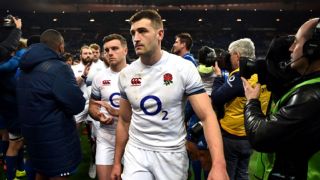|
PARIS, France -- Do not expect an immediate solution to England's breakdown issues. As England regroup having lost their second Six Nations match on the bounce and the title to Ireland along with it, Eddie Jones is trying to find short and long-term resolutions to a problem which has caused them to fall behind their rivals. "[The breakdown is] a sizeable but fixable problem," Jones said. "We can address it and keep getting better at it, but the reality is that we probably won't get better at it until the World Cup." It is a question of pressure, power and numbers. Whenever England carried into the French, they were met by a brick wall and struggled for quick ball; on the flip side when France attacked, they flooded the breakdown and as England adjusted, the ball had already been shifted. "They've got more numbers on their feet than we've got, it's very simple," was Jones' take. He added: "Our players tend to sit back and not go with the ball-carrier, because of habits they have, and we're working hard to change that habit, but when we're under pressure it comes back, therefore we get a gap between the ball-carrier and the second man." These are habits formed in the Aviva Premiership where there is a mentality of leaving the breakdown alone, adapting to the new laws brought in at the start of the season which were policed closer in the English top flight than in the Top 14 or PRO14. Exeter Chiefs have mastered the breakdown-less approach, while on the flipside, Munster's win over Leicester in the Champions Cup was a perfect example of a team outfoxing their English counterparts by contesting that area. But Jones is not looking to the Premiership for excuses or answers. Instead, it is back to circling the wagons, remaining introspective. "I'm worried about the breakdown, we've got to sort the breakdown out and find ways of getting quick ball," Jones said. For those at the coal face, Saturday's defeat in Paris was a frustrating experience. "It's a very hard place to adapt to," James Haskell said. "You have a go and you get penalised, so you don't want to go in again." He pointed to French tactics of having the tackler laying on the floor, allowing another to jump over him and into the ruck with another joining, killing any chance of quick ball and leading to England being whistled for holding on. "International rugby is dramatically different now from where it was 12 months ago," Haskell added. "It's a lot more of a power game with more physicality around the breakdown. There are no miracle answers, it's just practice."  The power game is another ingredient England are lacking. Haskell brought that from the bench, but other than Kyle Sinckler and Nathan Hughes, who went off injured after 24 minutes, they lacked the ballast to break down the French defence and impose themselves. "We need to get momentum," Jamie George said. "If you're carrying into a brick wall, it's pretty easy to get over the ball. That's probably what we need to look at first." Jones said the way the game is changing "will enforce selection change" as without power, they are not getting momentum. But he does not have another big No.8 up his sleeve with both Billy Vunipola and Nathan Hughes unavailable for their final championship match against Ireland. Haskell could and probably should start from the outset, but the policy of shoehorning three locks into the pack results in a loss in the power stakes. With Sam Underhill injured and out for the rest of the season, Jones has turned to Don Armand as a potential short-term fix. Zach Mercer, meanwhile, is a whippet in and around the breakdown and could offer out-and-out pace to combat England's lack of force on the road to Japan. Then there are the currently unavailable contenders: Carl Fearns is injured and in the Top 14, while Brad Shields does not arrive at Wasps until after this year's Super Rugby. They need to find power outside of the pack, too, with a certain Leicester centre somewhere on Jones' radar. "I just don't think he [Manu Tuilagi] is ready at the moment, he's off the pace and he just needs consistent rugby, but certainly he's the sort of guy that suits the sort of rugby that's being played at the moment," Jones said. "You saw the effect that [Mathieu] Bastareaud had."  Options for the future, but not necessarily for the present, perhaps aligning with Jones' theory that it could take the best part of 18 months for them to find the right mix of power and breakdown prowess. But what they must address in the next six days is their indiscipline. They conceded 16 penalties in Paris. "When we look back, we'll see we weren't streetwise enough," Danny Care said "We gave away too many penalties which is an easy lift for them; the crowd gets louder and this is a stadium where you want to quieten them down." England cannot make the same mistakes against Ireland. Jones has said all along that his third campaign in charge would be the toughest. The team needs to take another step forward in their evolution, but he does not feel England are now in a cycle of defeats. "We're being exposed in certain areas at the moment," Jones said. "And it's better happening now because it gives us a chance to fix it. And I always said this year would be the hardest year we'd have." He went on to say he feels this will benefit England in the long run, with issues rearing their head now rather than in Japan next year at the World Cup. But in the short-term, England must regroup and improve for Ireland. They shut down any notion of motivation coming in the form of stopping the Irish Grand Slam - as Joe Schmidt's men did to them last year - but instead have a chance to regain face or risk their worst Six Nations campaign in 12 years. "We do owe the country," Jonny May said. "People support us and we have an opportunity when we wear that shirt to inspire them and it hasn't been good enough in the last couple of weeks."  When Jones got the job, he said his goal was to make himself redundant by the World Cup, as the team would be player-led. But this is still very much a work in progress. The players need to be able to readjust mid-match to the referee, while it is Jones' job to find the right mix of power and acumen to ensure England can match and better others. For the players, they will now head back to Pennyhill Park, in uncharted territory under Jones but equally resolute in their desire to put things right against Ireland on Saturday. "This is the test of the team," Haskell said. "We have to go away to work on it. It's very disappointing because we wanted to win the title three years in a row but we haven't done that. It's important to keep our heads and keep our confidence, but understand that there's work that needs to be done. "Sometimes you have to take your medicine and the true test of a side is dealing with defeats."
|

